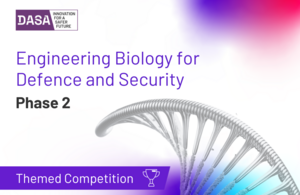Building Better with Biology: New £500,000 Themed Competition
Do you have an innovation that could solve a range of defence and security challenges and enhance capability by applying engineering biology approaches?

- DASA has launched a new Themed Competition called Engineering Biology for Defence and Security – Phase 2
- Funded by the Defence Science and Technology Laboratory (Dstl)
- Up to £500,000 (ex VAT) funding available for innovative engineering biology technologies
The Defence and Security Accelerator (DASA) is pleased to launch an exciting new Themed Competition: Engineering Biology for Defence and Security Phase 2. Run on behalf of the Defence Science and Technology Laboratory (Dstl), this competition is seeking new proposals that solve a range of defence and security challenges and enhance capability by applying engineering biology approaches.
The competition will involve the Ministry of Defence (MOD) and the US Department of Defense (DoD). Both the MOD and DoD will have access to proposals submitted under this competition in order to jointly assess which proposals to fund.
Key dates and funding
- Up to £500,000 (ex VAT) funding is available. There is no upper limit per proposal, but as a guide, we are expecting to fund around 3 - 5 proposals.
- The deadline to submit a proposal is midday (GMT) on Wednesday 17 January 2024
- A Q&A webinar to discuss the competition requirements will take place on Monday 20 November 2023
- A series of fifteen minute 1-2-1 webinar sessions will take place on Monday 27 November to ask specific questions
What is synthetic biology?
Synthetic biology is the design and fabrication of biological components and systems that do not already exist in the natural world. The process of taking synthetic biology concepts and turning them into real world solutions is engineering biology.
Engineering biology is a disruptive technology, identified as being one of the defining technologies of the 21st Century, and an important tool for achieving the sustainability targets set by the UK Government.
The tools and technologies emerging from engineering biology have the potential to transform many parts of the UK industrial base. As with other sectors, defence and security is looking for new bio-enabled approaches to develop new capability and reduce its carbon footprint.
We are seeking cutting edge, multidisciplinary research through the application of engineering biology tools and techniques, using novel research approaches and the discovery of new knowledge.
This Themed Competition builds on the previous Engineering Biology Phase 1 competition launched in 2022 that demonstrated the potential of the technology. We are now expanding to further develop applications which identify and evaluate innovative engineering biology approaches to improve wider defence and security capability.
Please note this is the second phase of funding for a multi-phase competition. It is not compulsory to have been involved in Phase 1 to apply. It is hoped that work for this phase will reach higher maturity than work funded in Phase 1.
Do you have an innovation that could help solve a range of defence and security challenges and enhance capability by applying engineering biology approaches? Read the full competition document and submit a proposal.
The challenge areas
Submitted proposals should choose to target one or all of the below challenge areas:
- Challenge 1: Power and Energy - analytical and experimental critical function and/or characteristic proof-of-concept
We are seeking engineering biology concepts that can offer a step change in existing power source and energy storage solutions for military applications.
- Challenge 2: Materials for Defence - technology component and/or basic technology subsystem validation in laboratory environment
We are seeking materials for a range of uses in defence and security. These materials could be relevant to a range of challenges including protection against physical attack, survival in extreme environments and development of generation-after-next capability, but excludes exposure to chemical and biological agents. Any novel materials must involve engineering biology at some stage of their production, but chemical modification of biologically-derived precursors is acceptable.
- Challenge 3: Sensing - analytical and experimental critical function and/or characteristic proof-of-concept
We are seeking bio-enabled sensing innovations that push the boundaries of what can be achieved. Any sensing modality may be relevant, and any operational environment is pertinent to this call, e.g. land, sea, air or space. In addition to sensing devices, integrated response functions are also desirable.
It is envisaged that this competition will involve cutting-edge, multidisciplinary research through the application of engineering biology tools and techniques, using novel research approaches and the discovery of new knowledge. Solutions do not have to be exclusively engineering biology, but must contain synthetic biology as a core component of any proposed solution.
Want to learn more about these challenge areas? Read the full competition document here.
Webinars and online events
Launch Q&A Webinar: Monday 20 November 2023
This webinar will provide more information on the challenge areas and how to submit a proposal. There will also be an opportunity to ask questions in the Q&A.
Register now on the Eventbrite page
1-2-1 Sessions: Monday 27 November 2023
A series of 20 minute one-to-one teleconference sessions, giving you the opportunity to ask specific questions.
Register for a session now on the Eventbrite page
Submit a proposal
Do you have an innovation that utilises engineering biology concepts in defence and security? Submit an idea and help exploit synthetic biology to address key defence and security challenges.
Read the full competition document to learn more and submit a proposal.